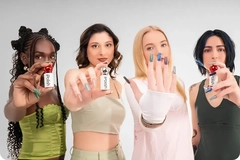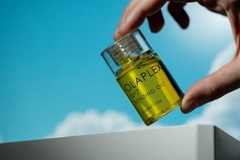TikTok ban threat propels C-beauty brands into mainstream spotlight

Mounting uncertainty around TikTok’s future in the US, including reports of a possible standalone US version, has triggered a ripple effect across the beauty industry. Millions of users have flocked to Chinese lifestyle app Xiaohongshu, boosting the global visibility of Chinese cosmetics.
The Chinese-owned platform has until September 17 to sell its US operations or face a nationwide ban. With the deadline rapidly approaching, shifting user behavior has helped Chinese beauty brands gain traction among Western consumers, particularly through viral videos and influencer-led product reviews.
China’s cosmetics industry is benefiting from social media exposure and changing global market dynamics. Domestic brands such as Judy Doll and Flores have seen international sales spike after products like steel-brush mascaras and cushion foundations received increased attention on social media.
At the premium end, Chinese cosmetics brand Mao Ge Ping has gained ground in the luxury beauty market. It doubled its stock price after its Hong Kong IPO and is closing in on Chanel’s share in China. The brand blends traditional aesthetics with high-end cosmetics, and taps cultural pride to fuel its expansion into international channels like LVMH’s Sephora.
While C-beauty brands receive exposure, multinational players, including L’Oréal, Estée Lauder Companies (ELC), and Kao Corporation, are adjusting their strategies in the country.
L’Oréal recently denied rumors about its Hong Kong office closing but confirmed a strategic realignment, which the company hopes will better serve changing consumer behavior in the Greater Bay Area. Both ELC and Kao have cited declining demand in mainland China as a key challenge in their recent earnings.
Combining online influence, product innovation, and an understanding of shifting consumer values, China’s cosmetics industry is carving out its role in shaping global beauty.
.jpg) Over two million American users reportedly switched from TikTok to Xiaohongshu, also known as Rednote.Platform pipelines
Over two million American users reportedly switched from TikTok to Xiaohongshu, also known as Rednote.Platform pipelines
The shift from TikTok to Xiaohongshu began in January this year, when the US Supreme Court reviewed a possible nationwide ban of the short-form video app. In response, over two million American users reportedly switched to Xiaohongshu, also known as Rednote.
The lifestyle app, which shares features with TikTok, was already a hub for Chinese beauty content. US-based content creators began using Xiaohongshu to explore emerging trends and shared them on TikTok, increasing the visibility of Chinese cosmetics among international audiences.
One such video featuring a Chinese-style makeup look and products received over 2.3 million views. While TikTok remains in use in the US, Xiaohongshu has become a platform for product discovery beyond China, with tutorials, linked items, and influencer engagement contributing to increased overseas sales.
Judydoll is among the most visible winners of this wave. Founded in 2017, the brand saw overseas sales increase by 400% in 2024. Its curling mascara, which uses a spiral-shaped metal wand instead of a traditional brush, became viral with millions of views on TikTok and Xiaohongshu. According to parent company Joy Group, Judydoll has now sold over eight million units of the product globally.
Similarly, Flores’ cushion foundation, priced at US$46 and known for its packaging inspired by Chinese art, has performed particularly well in international markets. The brand leverages TikTok Shop and other social platforms to bypass traditional retail models and reach overseas consumers directly.
C-beauty on Chanel’s heels
While some C-beauty brands compete through affordability, others target luxury segments. Mao Ge Ping is emerging as a competitor to long-established Western beauty companies.
The brand, founded by Chinese makeup artist Mao Geping, became the first domestic cosmetics company listed on the Hong Kong stock exchange in December 2024. Strong investor confidence helped its stock price double within three months.
According to Chinese investment firm Dong Fang Cai Fu, Mao Ge Ping now holds a 1.8% share of China’s premium beauty market, placing it just behind Chanel at 2%.
While the gap remains narrow, the comparison is notable, as Western brands such as ELC, Lancôme, and L’Oréal account for around half of the Chinese market. Mao Ge Ping is the only Chinese brand listed among China’s top 15 premium cosmetics players.
The brand’s strategy follows a “premiumization” model, which includes luxury pricing, partnerships with international manufacturers, and direct cultural collaborations, such as a product line developed with Beijing’s Forbidden City, the historic imperial palace complex.
This approach has resonated with Chinese consumers and helped to differentiate it from more mass-market domestic labels, with repurchase rates exceeding the national average.
Mao Ge Ping is also building relationships with influencers and department stores across Southeast Asia..jpg) L’Oréal is reducing its reliance on China as a growth driver, calling the retail environment “challenging.”
L’Oréal is reducing its reliance on China as a growth driver, calling the retail environment “challenging.”
Dong Fang Cai Fu projects the brand will exceed ¥5.3 billion (US$35.8 million) in revenue for 2025, which is a 40% increase from the year prior.
Multinationals lose ground
While Chinese beauty brands gain global visibility, established multinationals are reassessing their strategies in China.
L’Oréal recently responded to reports of a Hong Kong office closure by confirming a structural merger with its mainland operations. The move aims better to serve the increasingly digital and interconnected Greater Bay Area.
At the same time, the company is reducing its reliance on China as a growth driver, calling the domestic retail environment “challenging.”
Coty echoed similar concerns, stating that China is no longer a key short-term growth contributor. Other companies, including Kenvue and Edgewell, have also cited softened growth and market disruption across the Asia-Pacific region, with China being a major contributing factor.
Amorepacific reported a 27% decline in last year’s sales in Greater China, and ELC and Kao Corporation’s regional sales also dropped.
The brands all cite heightened local competition.













